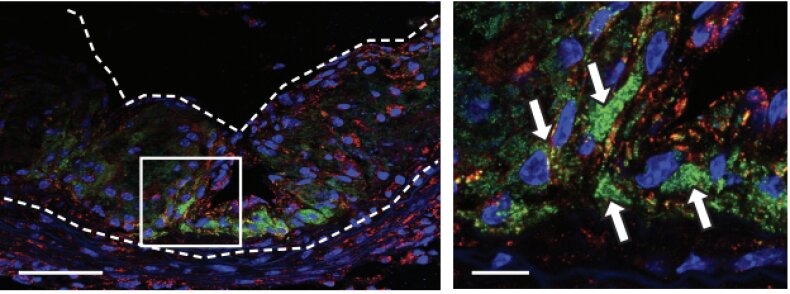
Image Credit: Bryan Smith/Michigan State University
Over the years, extensive research into the potential applications of nanoparticles has resulted in illuminating evidence of the special properties these microscopic particles possess. Now, a group of scientists at Michigan State University (MSU) and Stanford University has used such research to create a particle intended to eliminate the plaques that cause heart attacks.
The microscopic particle which could prevent atherosclerotic cardiovascular disease was the result of a collaboration led by Brian Smith, associate professor of biomedical engineering at MSU. According to Smith and his team, the nanoparticle can be controlled to target and eat debris in order to reduce the build-up of plaque in the arteries. The result of this procedure would be a controlled, stabilization of plaque levels which would limit one of the leading causes of heart attacks and strokes.
Trojan Horse
Published in the journal Nature Nanotechnology, the scientists dubbed the nanoparticle a “Trojan Horse” in their findings as it can infiltrate specific cell types – monocytes and macrophages. Once embedded into these cell types the nanoparticle and deliver a drug agent that stimulates cells to consume cellular debris. What this means is that the cells begin to eat diseased and dead cells at center of the plaque.
Smith said that future clinical trials on the nanoparticle are anticipated to reduce the risk of most types of heart attacks, with minimal side effects as a result of the unprecedented selectivity of the nano-drug.
Throughout the research, Smith and his team noticed their technique prompted the macrophages to target and absorb the inflammatory cells, an underlying factor of atherosclerosis.
We could deliver a small molecule inside the macrophages to tell them to begin eating again.
Brian Smith, Associate Professor, Biomedical Engineering, MSU
The demonstration that the nanoparticles were able to specifically target the problematic cells should open the door to, “clinical translation of these nanomaterials using large animal models and human tissue tests,” according to Smith.
Targeting Atherosclerosis
Atherosclerosis is a serious condition considered to be one of the leading causes of death in the US. As plaque builds-up in it the arteries, it restricts the blood flow and oxygen supply due to the constricted and hardening of the vascular tissue. Often symptomless to begin with, it can eventually lead to strokes and heart attacks, which is why treatments to mitigate the consequences of the condition are vital.
Engineering nanoparticles in nanomedicine is now a leading approach for exploring the management of atherosclerosis. Some of these techniques include functionalized nanoparticles to enhance active imaging as well as developing other therapeutic models for the prevention of the disease. The issue with the current methods is that while useful they tend to focus on the superficial elements of plaque build-up and cell disease and decay.
Core Stimulation
The research carried out by Smith and his team concentrates on an interception of the signaling of the receptors in the macrophages. The next phase is to then communicate a message via small molecules using nano-immunotherapeutic platforms into the cells. As mentioned, researchers have been investigating similar techniques at the surface of the cells, but Smith’s state-of-the-art intracellular approach works demonstrating effectiveness in core stimulation of the macrophages. Speaking of the innovation, Smith declared, “We believe it is better than previous methods.”
What’s more is that the MSU collaboration with Stanford has accelerated the potential of biomedical uses for the nanoparticle as well as enhancing knowledge around atherosclerosis.
We were able to marry a groundbreaking finding in atherosclerosis by our collaborators with the state-of-the-art selectivity and delivery capabilities of our advanced nanomaterial platform.
Brian Smith, Associate Professor, Biomedical Engineering, MSU
As well as moving on to clinical trials on animal models and human tissue tests, Smith will pursue a patent of the technology and begin a marketing strategy later this year.
Disclaimer: The views expressed here are those of the author expressed in their private capacity and do not necessarily represent the views of AZoM.com Limited T/A AZoNetwork the owner and operator of this website. This disclaimer forms part of the Terms and conditions of use of this website.